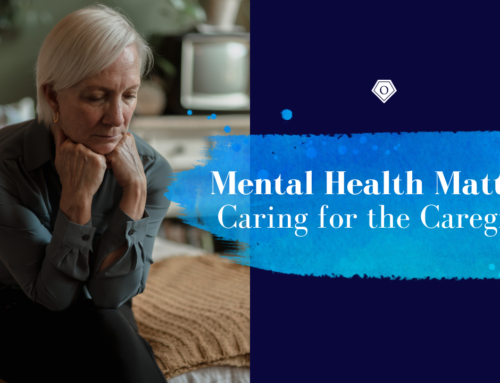The world can feel overwhelming for anyone in the aftermath of a hurricane. For individuals with dementia, the disruption of routines, unfamiliar sounds, and heightened anxiety can lead to confusion, fear, and agitation. As caregivers, your role becomes even more vital in helping your loved one find a sense of calm amid the chaos. One way to do this is through sensory activities that can soothe and bring comfort during this stressful time.
Here are some simple yet effective sensory exercises and comforting routines to help your loved one with dementia stay grounded and reassured during post-hurricane recovery.
Engage with Soothing Sounds
Sound can have a powerful effect on mood and cognition, especially for those with dementia. Unusual noises that follow a storm—such as chainsaws, generators, or even silence in the absence of electricity—can disorient your loved one. Calming music or familiar sounds can create a soothing backdrop and help redirect focus.
Ideas:
- Play soft, familiar music from their past that evokes happy memories. Classical music, nature sounds (like rain or birds), or their favorite songs can all be comforting.
- To create a peaceful environment, use a sound machine or app that plays ocean waves, forest sounds, or rain.
- Encourage your loved one to hum or sing along if they feel up to it, which can help them feel connected and engaged.
Use Gentle Touch and Tactile Activities
Touch is a powerful sense that can promote relaxation. Simple tactile activities can provide reassurance and help dementia patients stay focused when other stimuli might be overwhelming.
Ideas:
- Offer a soft blanket or a favorite item of clothing they enjoy holding or stroking. The sensation of something familiar can be immensely calming.
- Provide a textured stress ball, plush toy, or fabric with various textures (such as velvet or fleece) for them to hold. This can help them stay calm during tense moments.
- Engage in simple hand massages using a gentle, fragrant lotion. Lavender or chamomile scents can add a calming aromatherapy element.
Incorporate Familiar Smells
Smell is strongly linked to memory and emotions, and using familiar scents can help dementia patients feel more at ease. When routines are disrupted, and the environment feels foreign, introducing familiar aromas can be a great way to create a sense of comfort.
Ideas:
- Use essential oils with familiar, calming scents, such as lavender, vanilla, or peppermint. Add a few drops to a cotton ball or handkerchief they can keep close by.
- If possible, bake something simple, like bread or cookies, that will fill the house with a warm, inviting aroma.
- Encourage your loved one to engage with familiar scents, like a favorite perfume or soap, to trigger positive memories and emotions.
Visual Stimulation and Familiar Objects
Dementia patients often rely on familiar objects and surroundings to feel safe. After a hurricane, the environment may feel unfamiliar or even threatening. Providing visual reassurance can help restore a sense of normalcy.
Ideas:
- Surround your loved one with familiar objects that hold personal significance—such as family photos, a favorite book, or a beloved item of clothing.
- Use soft lighting, especially in the evenings, to avoid harsh shadows that might cause confusion.
- If possible, create a small “comfort space” where they can sit and relax, filled with items that make them feel secure.
Rhythmic Movements and Gentle Exercise
Physical movement, especially if it is repetitive and rhythmic, can help calm anxiety and agitation in dementia patients. Simple, familiar movements can also bring comfort and reduce feelings of stress.
Ideas:
- Encourage gentle rocking in a chair or rhythmic tapping to a slow beat. This can provide a calming sensory experience.
- Try simple stretches or light chair exercises that match your loved one’s abilities. These movements can help release tension and provide a sense of routine.
- If your loved one enjoys dancing, put on some soft music and encourage them to sway or move along gently.
Engage in Simple Routines
Familiar routines offer stability, which is especially important in times of disruption. Even if the power is out or regular activities aren’t possible, try to maintain consistency in daily tasks.
Ideas:
- Stick to regular mealtimes and bedtimes, even if the meals themselves are simpler than usual.
- Keep activities low-key but structured. For example, setting the table, folding laundry, or sorting familiar objects like buttons or cards can create a sense of purpose.
- Offer simple, comforting activities that promote relaxation, such as reading aloud, knitting, or working on puzzles together.
Supporting Dementia Patients During Storm Recovery
While the post-hurricane period may be challenging, it’s important to remember that your presence and calm demeanor are the most reassuring things to your loved one with dementia. By incorporating sensory activities and familiar routines, you can help them feel more grounded and secure, even when the world outside feels uncertain.
As a home health care agency serving Volusia and Flagler counties, we’re here to help you navigate these difficult times. Whether you need respite care, support with daily tasks, or guidance in providing comfort for your loved one, we are here to assist you. Reach out to us today to learn more about how we can support you and your family during recovery. Together, we can create calm amid the chaos.
Alzheimer’s and Dementia Care
Onyx Home Care’s neurological disorder care is built around a system of support. This service includes skilled home care as well as a unique program that centers on the patient’s interests and stage of illness. Our goal is to see happy family members, patients and caregivers. Often times, caregivers feel remote. Our team includes each person in the home care process to provide inclusive care that helps the patient thrive.






